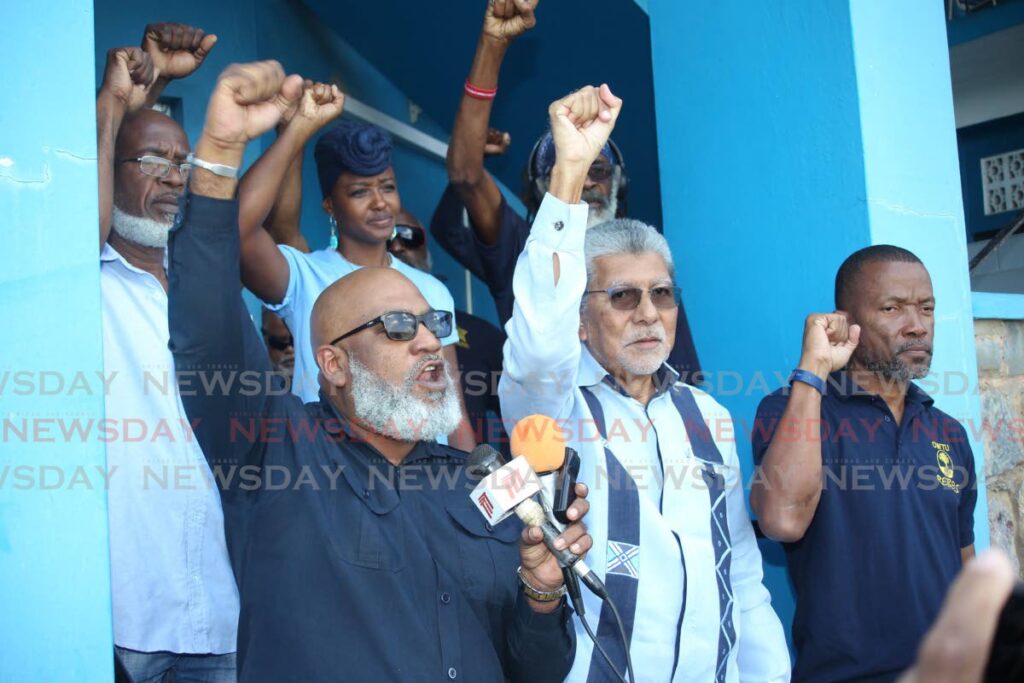Union leaders reflect on Bloody Tuesday struggle 48 years later

ON the 48th anniversary of Bloody Tuesday, March 18, 1975 –when oil and sugar workers were teargassed, beaten and arrested as they marched along Coffee Street, San Fernando, for peace, bread and justice – trade unionists are saying the issues that led to that incident exist again today.
Chief education officer of the Oilfield Workers Trade Union (OWTU) Ozzie Warwick says that today the working class has to stand up as its predecessors did in 1975, to take on the State and capital, or all the social benefits won through the struggle would be eroded.
On Saturday, on the steps of the OWTU’s Paramount Building headquarters, where the historic march began 48 years ago, Warwick, joined by colleagues representing the Joint Trade Union Movement (JTUM) and the Movement for Social Justice (MSJ), said the State was using its power to roll back those benefits.
Warwick said when one considered the cost of living and the struggle of ordinary men and women just to survive, the commemoration of Bloody Tuesday became even more relevant.
“If we allow them (the State) to take our benefits, dignity and rights to be respected as a human being, then we would have gone back 100 years. As the working class, we must continue to strive and to struggle to ensure that we protect what we have, and advance to improve the quality of life.”
Reflecting on the dire economic circumstances of oil and sugar workers which led to the historic event, MSJ political leader David Abdulah, who organised the commemoration, said the sacrifice thousands of workers made on that day, yielded not only significant benefits, but demonstrated the power of the people.
He said oil workers got a significant increase that allowed them to invest in their own homes, sugar workers received a 100 per cent increase, and cane farmers also got a significant increase in the price of their product, which was then sold to the British-owned Tate and Lyle.
Abdulah said that struggle also resulted in the nationalisation of Tate and Lyle and American-owned Texaco into Caroni (1975) Ltd and Petrotrin, and the formation of the United Labour Front (ULF), first as a trade union grouping, and subsequently into a political organisation.
The rationale for transforming the ULF into a political party was the understanding that those who laboured must hold the reins of power, Abdulah said.
“We, (workers) have the power, but we give it to the politicians every five years, and they use that power to attack the very people who put them in office.
“Given the inequality of society, hardship – tens of thousands are facing higher food prices, transportation, gas prices, and now higher electricity and water rates – we have to move to the point of consciousness, to that revolution of the mind, where we say those who labour must hold the reins of power.”
Abdulah said it is time for disciplined mass action, because while Texaco and Tate and Lyle have gone, “We still have BP and Shell and BHP (Woodside), Royal Bank has come back, and along with local conglomerates, remain the owners and controllers of economic power.
“We have to disrupt that system and change the arrangement...those who control the political power must no longer be in the back pockets of the controllers of economic power.
“It is important that those who labour must hold the reins of power. That is why March 18 is so important.
“That revolution of the mind must start with young people knowing that 48 years ago, their parents, grandparents got beaten, teargassed and arrested for peace, bread and justice, which yielded benefits so they could get better jobs, go to universities.”


Comments
"Union leaders reflect on Bloody Tuesday struggle 48 years later"